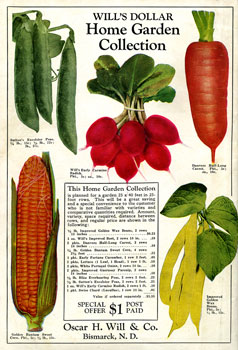
1930 Oscar Will Seed Company Catalog
Back Cover
SHSND# 10190Onions were classed by color. Beets were identified as table beets, sugar beets, or mangels/wurzels, and carrots were identified as table carrots or (live)stock carrots. But potatoes enjoyed particularity not attached to other vegetables. Perhaps this represents the enormous importance placed on potatoes by early residents of ND. As can be seen in the drought of the 1930s, a failed potato crop could be disastrous for a farm family. Another interpretation might be reflected in the efforts of the vegetable breeders in the state to locate vegetables that were early, hardy, and drought resistant. A trial of potato varieties through the unscientific, but highly popular venue of a county or state fair, suggests a means of distributing information about successful varieties of potatoes quickly through the gardening population.
For all of the interest displayed by the NDAC/NDAES horticulturists and seedsmen such as Oscar H. Will in corn and tomato varieties, there is little evidence of similar interest at the fairs. Tomatoes come close to such divisions only with color (yellow or red) and some qualities (preserving) to classify the entries, but few are named by variety. This may suggest the long years of failure of gardeners to raise tomatoes successfully and reliably, and also the late or early date of most of these fairs. The Fargo/Cass County/State Fair was usually held in July. Others were in September or October. It was either too early or too late for tomatoes. However, in 1910, the Fargo fair offered a substantial prize ($10 worth of garden seeds) for the best exhibit of six Thornber tomatoes. No reference to Thornber tomatoes has been found elsewhere. There was also a prize for “The Big 4” varieties of tomatoes which included Thornber, Yakima, Dakota Farmer, and Early June.




